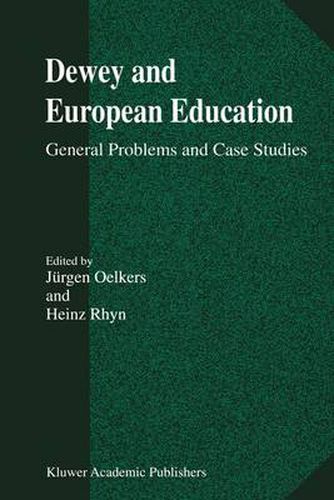Readings Newsletter
Become a Readings Member to make your shopping experience even easier.
Sign in or sign up for free!
You’re not far away from qualifying for FREE standard shipping within Australia
You’ve qualified for FREE standard shipping within Australia
The cart is loading…






This title is printed to order. This book may have been self-published. If so, we cannot guarantee the quality of the content. In the main most books will have gone through the editing process however some may not. We therefore suggest that you be aware of this before ordering this book. If in doubt check either the author or publisher’s details as we are unable to accept any returns unless they are faulty. Please contact us if you have any questions.
Although John Dewey’s ideas have been of central interest in Anglo-Saxon philosophy and history of education, similar interest has developed slowly in continental Europe. Deweyan philosophy of education has had to pass through national filters, which meant that it was received in national contexts of reform. The German Dewey was differently construed to the French, Italian, or English Dewey. This seems to change after 1989 (and the fall of socialist education) when interest in Dewey increased. The political and philosophical interest in Dewey has to do with the lost alternative socialism , and thus with the opening of Eastern Europe and the new problems of education within a worldwide community. This volume stresses two points. The original interest of European education in Dewey is presented in case studies, concerning different national contexts and thus different Deweys. What can be called the renewal of interest is argued from different sides. The book aims to show that interest in Dewey is not the remake of the reception within the different camps of progressive education.
$9.00 standard shipping within Australia
FREE standard shipping within Australia for orders over $100.00
Express & International shipping calculated at checkout
This title is printed to order. This book may have been self-published. If so, we cannot guarantee the quality of the content. In the main most books will have gone through the editing process however some may not. We therefore suggest that you be aware of this before ordering this book. If in doubt check either the author or publisher’s details as we are unable to accept any returns unless they are faulty. Please contact us if you have any questions.
Although John Dewey’s ideas have been of central interest in Anglo-Saxon philosophy and history of education, similar interest has developed slowly in continental Europe. Deweyan philosophy of education has had to pass through national filters, which meant that it was received in national contexts of reform. The German Dewey was differently construed to the French, Italian, or English Dewey. This seems to change after 1989 (and the fall of socialist education) when interest in Dewey increased. The political and philosophical interest in Dewey has to do with the lost alternative socialism , and thus with the opening of Eastern Europe and the new problems of education within a worldwide community. This volume stresses two points. The original interest of European education in Dewey is presented in case studies, concerning different national contexts and thus different Deweys. What can be called the renewal of interest is argued from different sides. The book aims to show that interest in Dewey is not the remake of the reception within the different camps of progressive education.